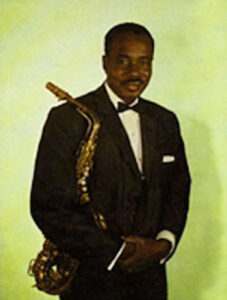
'Buster' Smith
*'Buster' Smith was born on this date in 1904. Also known as Professor Smith, he was a Black jazz alto saxophonist.
Henry Franklin "Buster" Smith was born and raised in Alsdorf, Texas, a small town near the outskirts of Dallas. He earned the name "Buster" from his parents and was the third of five boys with no sisters. His early musical influences were his parents, who played guitar. At four years old, Buster played the organ with his brother, pianist Boston Smith; Buster played the keys, and Boston stepped on the pedals. In 1919, Smith picked cotton to buy a $3.50 clarinet. Smith learned to play several instruments by the time he was eighteen.
In 1922, Smith and his family moved to Dallas. He joined the Voodie White Trio, playing Alto saxophone and clarinet. In 1923, he began his professional music career playing alto saxophone with the medicine shows, very loudly to attract more customers. This experience defined his musical style, characterized by loudness, and led to 'Hot Lips' Page inviting Smith to join his group, the Oklahoma City Blue Devils, in 1925. Over the next few years, Smith wrote much of the group's music and lyrics with co-workers from his bank. When Smith joined the Blue Devils, they toured the Kansas City area and the Midwest, playing Jazz for a year, bringing all its members into prominence.
After leaving the group, he and Count Basie formed the Buster Smith-Count Basie Band of Rhythm, where the two innovated a louder style of Jazz. Buster contributed to the unique sound by using a tenor saxophone reed in his alto saxophone to achieve a louder, "fatter" sound. Lester Young also joined the band and, to complement Smith's louder sound, he also opted for a harder reed, using a baritone saxophone reed on his tenor saxophone. This sound was later labeled the Texas Sax Sound. Smith gained significant influence in the Texan music community and industry.
Smith mentored Charlie Parker during the 1930s, developing a "father-son relationship" through mentoring Parker. In 1941, Smith returned to Dallas and ceased touring, though he remained active in the local music scene. Smith wrote for jazz and blues bands in the following years, played often, and taught many young Texan musicians, including Aaron "T-Bone" Walker and Red Garland. He also performed session work with Pete Johnson's Boogie-Woogie Boys, Eddie Durham, Leo "Snub" Mosley, Bon and His Buddies, and the Don Redman Orchestra. In 1959, Buster led his first solo recording session, prompted by Atlantic Records.
For the sessions, Buster enlisted his brother Boston Smith to play piano and musicians spanning his career to date. In the 1960s, Smith was involved in an auto accident in which he was injured and could no longer play the saxophone. He started playing the bass guitar throughout Dallas and continued participating in the Dallas musical community. Buster led a dance music band until 1980 and played in the Legendary Revelations in the mid-1980s. Smith died of a heart attack in Dallas on August 10, 1991.